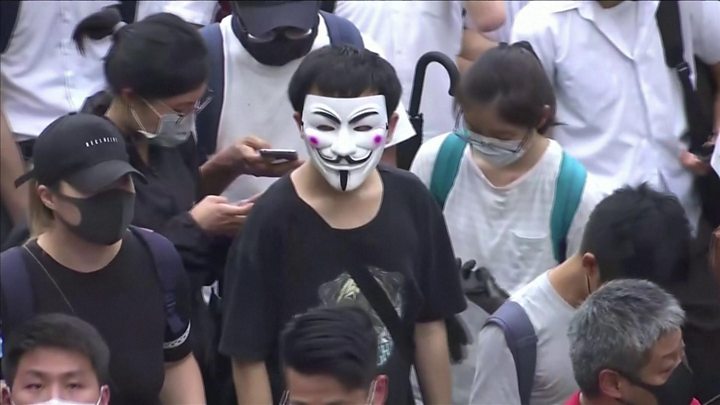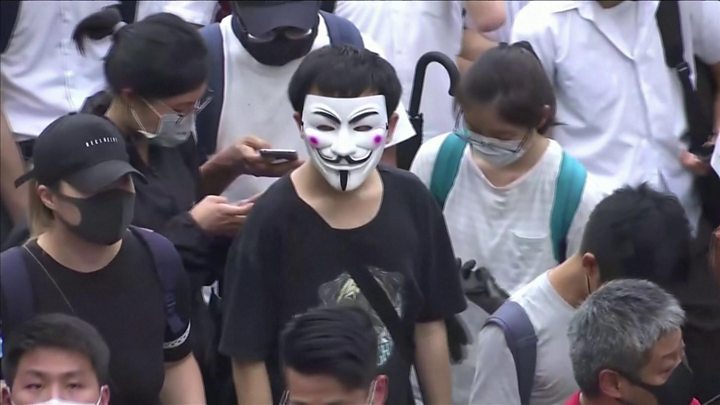Hong Kong: Transport paralysed in clampdown on rioters
Most of the territory’s metro system is shut down after a day of violent anti-government protest. …


Media playback is unsupported on your device
Most of Hong Kong’s metro system remains shut after a day which saw stations and businesses attacked in violent anti-government protests.
Only the Airport Express remained open as protesters began fresh demonstrations in the autonomous Chinese territory.
Chief executive Carrie Lam has defended her decision to invoke emergency powers in order to restore order.
Hong Kong had been through a “very dark night” of “extreme violence”, she said.
Unrest intensified on Friday after a young demonstrator was shot in the leg by a police officer.
Protesters have also called on people to defy a ban on face masks announced by Ms Lam.
Unrest in the former British colony started in June, sparked by proposals to extradite suspected criminals to mainland China.
The extradition bill was subsequently cancelled but protests have widened into pro-democracy and anti-police demonstrations.
What is the situation on Saturday?
MTR (Mass Transit Railway), the rail operator, said it was unable to resume normal services as repairs were still being made at damaged stations. A limited bus service would be provided.
Supermarkets and banks were also closed, reeling from Friday’s chaos when rioters targeted MTR stations and, reportedly, businesses with links to mainland China.
“The radical behaviour of rioters took Hong Kong through a very dark night, leaving society today half-paralysed,” Ms Lam said in a pre-recorded video statement.
“The extreme violence clearly illustrated that Hong Kong’s public safety is widely endangered. That’s the concrete reason that we had to invoke emergency law yesterday to introduce the anti-mask law.”
“We cannot allow rioters any more to destroy our treasured Hong Kong,” she added.
Hundreds of protesters, many of them wearing masks, marched through the Causeway Bay shopping district on Saturday.
“We’re not sure what is going to happen later but we felt we had to get out and show our basic right to wear a mask,” Sue, 22, told Reuters news agency from behind her black mask and dark glasses.
“The government needs to learn it can’t squeeze Hong Kong people like this.”
A French resident, who gave his first name Marko, told AFP news agency the face mask ban was “adding oil to the fire”.
“But I think the people who destroyed the stations are extremists,” he said.
Pressure from business lobby
By Rupert Wingfield-Hayes, BBC News, Hong Kong
Thee more radical Hong Kong protesters have been wearing masks in part to protect themselves from tear gas – but also to maintain their anonymity. For both reasons the Hong Kong government wants the wearing of masks stopped.
From midnight (16:00 GMT) Friday anyone caught on the streets wearing a mask will be ordered to remove it. Mask-wearing demonstrators can be arrested and could face up to a year in jail. Carrie Lam is under intense pressure from the territory’s powerful business lobby to end the protests.
The violence on the streets reached a new level this week but invoking the emergency law for the first time in more than 50 years could also escalate the conflict.
The radical student groups leading the protests said they would defy the law.
How dangerous is the situation?
Over the months, clashes between police and activists have become increasingly violent.
On Tuesday, police shot a protester with a live bullet for the first time, wounding the 18-year-old, who was allegedly attacking a police officer.
On Friday, a boy aged 14 was shot in the leg with a live round in Yuen Long, a town to the west of the city.
A plain-clothes police officer with an unmarked police car was later set upon by rioters in the same area but officials did not link the two incidents, the South China Morning Post reports.
What is Hong Kong’s status?
Hong Kong is a former British colony handed back to China in 1997.
It has a “one country, two systems” agreement that guarantees it some autonomy, and its people certain freedoms, including freedom of assembly and freedom of speech.
But those freedoms – the Basic Law – expire in 2047 and it is not clear what Hong Kong’s status will then be.




